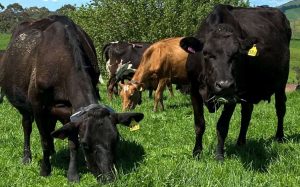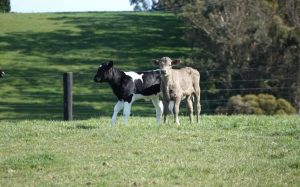
New boys in town as male-sexed semen offers control jpg: Blue male-sexed semen used over dairy herds produces a valuable and saleable calf instead of a bobby calf.
It is always a juggle to create a valuable product suitable for both the dairy and beef sectors, but ST Genetics NZ has released a new technology that benefits both. Its latest gender-sorting semen product has beef semen that has been sexed to male-only, giving dairy farmers more options to drive value from their non-replacement calves.
“Male sexed semen is already widely used in the USA and the UK and it’s great New Zealand farmers will be able to use it this season,” says ST Genetics NZ dairy beef and beef specialist Charlotte Broadbridge.
“It will help farmers secure a market for their calves and help ensure consistent calf quality for calf rearers, which is really important as there are fewer calf rearers around due to increasing costs and levels of uncertainty.”
The technology they use to sort the semen has many advantages over the old technology, with higher fertility and conception rates.
“There’s an increased need for bulls that can serve both the dairy and beef industries, particularly with the perceptions around bobbies and finding value chains for non-replacement calves.
“And there’s a lot of data supporting the value of dairy cross beef animals, so it’s a natural fit for male-sexed semen.”
Hereford, Speckle Park, Charolais and British Blue male-sexed semen is available and they have access to an international pool of bulls as it is challenging to find ones that will serve both dairy and beef.
The semen is being selected on Estimated Breeding Values (EBVs) from the beef industry, but there is a strong correlation between EBVs and what they see on the ground.
“The EBVs are the best information we have for selecting which bulls could be suitable, but cow type is a big piece of the puzzle, with more demand for beef cross calves from Friesian cows.
“In the USA and UK they have a different type of cow to what we have here in New Zealand, and that’s something we encourage farmers to keep in mind too,” says Broadbridge.
“That’s not saying it isn’t a good idea to use male-sexed semen in New Zealand cows, but it’s making the decision consciously with all the information available to minimise any risks.”
There have been large trials internationally looking at the success of male-sexed semen, and ST Genetics NZ is putting several bulls through a progeny test programme to have additional NZ-specific data backing the product.
“We are looking for a balance, particularly around calving ease and gestation length, and we have been trying to get growth and carcase data to validate that the animals will be worth rearing and that they can compete with traditional beef out the other side.”
Broadbridge says that, as with any new technology, there is a discovery period to understand any risks and considerations.
“When we talk to farmers about the product we start by finding out their experience with using conventional beef semen and what breeds might be suitable for their herd,” she says.
“It’s about weighing up what is right for their farm and they need to have confidence in any tool, that it will be right for their goals and their system.”
The company has begun a calving survey to collect data from NZ systems and is keen to follow some of the calves through the supply chain to understand their value as beef animals.
“We can clearly see the value in the overseas markets. With dairy cross beef animals making a significant portion of animals on feedlots in the USA for example, a lot of beef originates from the dairy industry.
“But it will take time to see the shift in the industry. People can be hesitant about dairy cross beef animals because they look different and they develop differently, but we want to make it clear they can still be a money maker and are a great option for many farmers.”
With experience in both the dairy and red meat sectors, Broadbridge appreciates the challenges both sides face with animal suitability. But she can see the opportunity for both industries to work together as the pressures on bobby calves continue to mount in NZ.
“Male-sexed semen will help farmers produce a consistent, reliable product and those bull beef calves will be able to enter a different value chain to reduce some of the bobby calf numbers and help with consumer and market perceptions.
“I’m really looking forward to seeing how farmers utilise this technology.”




















